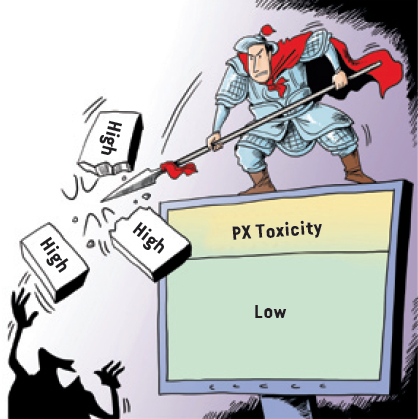|
 |
|
(CFP) |
Paraxylene, also known as PX, is an important but controversial chemical product for industrial use, and has become a topic of debate on the back of protests in Maoming, south China's Guangdong Province, over a planned paraxylene plant in late March. Before this, PX projects in China have sparked protests in several cities from Fujian to Yunnan provinces, often resulting in the projects being quashed or moved to more remote areas.
However, a more subtle form of protest was being carried out online when the chemical's entry in Baidu Baike, a popular online encyclopedia modeled after Wikipedia and owned by Chinese search engine Baidu, was changed more than 30 times in one day.
The events began on March 30, when a netizen changed the description of PX's toxicity in the entry from "low" to "high."
This modification caught the attention of students from the Department of Chemical Engineering at China's prestigious Tsinghua University, who reverted the text back to how it was before only two hours later, beginning the hectic back-and-forth battle.
The students argued that the toxicity of PX is not as high as perceived by the general public and hoped that people could have an accurate knowledge of the chemical. They kept an eye on the chemical on Baidu Baike day and night and corrected it whenever it was modified.
After 35 edits to the page, Baidu Baike locked the entry from being changed further and announced its decision to invite experts to write an accurate entry for PX with "authority and accuracy [so as to] help people build a rational understanding [of the chemical]."
In the end, the toxicity of PX was defined as "low."
Reliable sources
The spat on Baidu Baike sparked discussion on the reliability of collaboratively-edited online encyclopedias.
Founded in April 2006, Baidu Baike uses the slogan "the encyclopedia that everybody can edit." Figures show that more than 4.7 million Internet users have come together to create over 8 million items on Baidu Baike since then. Another online encyclopedia, Hudong Baike, which was set up in 2005 with the vision to be "the world's largest Chinese encyclopedia" has collected over 8.2 million items from more than 7 million "professional volunteers."
The difference here is between common "Internet users" and "professional volunteers." Although any Internet user can create or modify items on either website, Hudong Baike's figure only records the number of users who have registered with their real name and portrait and submitted a certificate that can prove they are a professional in the field of the entries they wish to create or edit. This way, it is possible to track the creator of most items on Hudong Baike and read about their careers and academic background easily. In contrast, Baidu Baike only allows you to see screen names. In 2007, Baidu Baike formed a group of active users who contribute most actively, though these members still only display their screen names and getting more detailed information on them is not easy.
Regardless, the content on these sites share many similarities and some entries are even identical.
"I think most active users have more time to dedicate and don't just copy and paste," said Zhang Yingying, a college student from Shandong Province who wrote an essay on the differences between online encyclopedias in 2007. "Sometimes, they abuse intellectual property rights by simply copying content from other sources."
Reliable references are a basic requirement of online encyclopedias for people who create or modify any of the items. Only verifiable information from professional essays or official media can be accepted.
"I am still confused of the criteria for something to be considered 'reliable'," said netizen Xiao Yueming, an active user of Baidu Baike. "Sometimes my edit of an item is rejected because the references I provided were not reliable, while my friend who submitted something with the same references on another item has their edits allowed."
| 